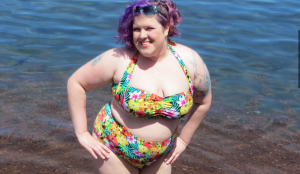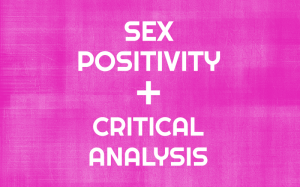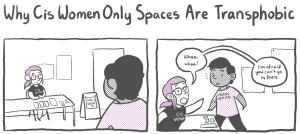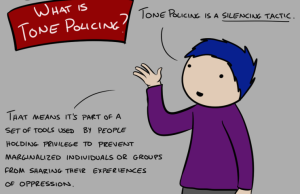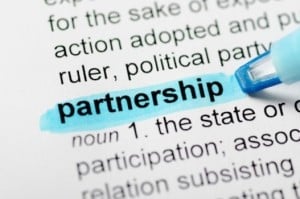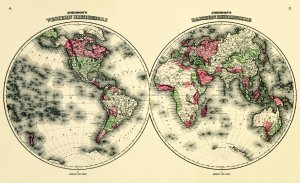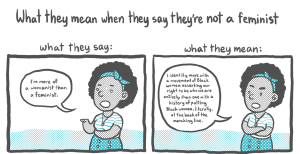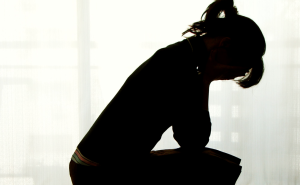
A person stands against a wall, frowning with their finger to their lips in a “shh” gesture. Source: Mix 96 Buffalo
My most (and least) favorite thing about the term “political correctness” is that it’s basically meaningless.
It’s become shorthand for saying “Ideas that I happen to find ridiculous are being taken seriously by a lot of people, and it’s ruining this country,” which makes its definition entirely subjective – and therefore arbitrary. For example, a person who’s all for same-sex marriage might scoff at gender-neutral restrooms as political correctness gone too far.
Because apparently, political correctness only goes “too far” when it applies to the unfamiliar, the not-often-talked about, the marginal, the stigmatized.
The thing is, there is nothing so sacred or precious about language or communication that people can’t seek ways to be sensitive and inclusive about its use. And yet, stick a trigger warning on a YouTube video and people have full on meltdowns over how oversensitive the world has become.
It’s as if people can accept the ways that language has changed already but draw a line the moment they reach a foreign concept. It’s why some of the same people who claim to defend LGBTQ rights dismiss gender neutral pronouns as oversensitive.
Though I understand why people dislike feeling like they must adjust their speech for people they’ve never thought about, I also wonder if they realize that we have been doing this to language since time immemorial.
The mythical special snowflake PC police did not descend from Lala Land in 2014, decide everyone was a bigot, and start overhauling human speech to accommodate their own small segment of the population.
As human knowledge has progressed and political climates have shifted, language has changed to reflect our widening understanding of what is normal, okay, compassionate, and appropriate to say.
And yeah, there are people who police and manipulate language for purely political ends or because they just don’t want to offend people.
And for people who are interested in being more sensitive about the use of language as a tool of compassion, these common complaints about “political correctness” look a lot like excuses for ignoring the power and impact of language on social progress.
1. People Are Too Sensitive
What people think they’re saying: “People are so self-important nowadays that they think the world has to cater to their sensitivities.”
What they’re actually saying: “It’s okay for the world to cater to the sensitivities of some people, but this group of people doesn’t count for some reason.”
The English language normalizes and validates heterosexuality, whiteness, maleness, and ability so ubiquitously that people forget that it reifies these things.
The foundation of the English language was built by white men, and its continued evolution has been largely directed by that same group of people.
In other words, what looks like catering to marginalized people is actually decentering a white, male perspective of humankind.
It’s true that you don’t owe the entire world a certain level of comfort, and you most certainly don’t need to manage your life around whether or not a person might be offended by the things you do or say.
But if you think that’s the point of things like trigger warnings or not making rape jokes, you’re mistaken.
Making the decision not to promote language that harms a large group of people — like victims of violence — is not particularly hard, compulsory, or overly cautious.
It is, however, a nice thing to do that costs you nothing.
It’s also one less microaggression piled on top of a toxic, victim-blaming culture in which the impact and prevalence of rape is often downplayed and misunderstood.
2. It Keeps Us from Saying What We Really Mean
What people think they’re saying: “People have to constantly walk on eggshells to avoid being labeled bigots. It keeps us from having real conversations and saying what we really mean.”
What they’re actually saying: “I want the freedom to call people what I please, but no one should call me a bigot.”
If you feel that you have to walk on eggshells to avoid being labeled a bigot, you might be in the habit of saying things that are bigoted.
I mean, given that even KKK groups deny being racist, it’s entirely possible to do and say clearly oppressive things without seeing that they’re oppressive.
So I’ll just say this: If the worst thing you could be called is sexist, racist, homophobic, a bigot, ableist, or the like, you have it pretty good.
Moreover, no one is immune to having prejudices or saying things that expose those prejudices. I may have them, you may have them, and the sooner someone calls us out on them, the sooner we can adjust our attitudes and language to reflect that new understanding.
3. So Much Focus on Words Distracts from More Important Issues
What people think they’re saying: “When we pay too much attention to the words people can or can’t say, we end up ignoring more important issues.”
What they’re actually saying: “All issues must be this important to ride.”
I actually agree that too much focus on nitpicking about what words are acceptable to say can be a distraction. That’s why this article isn’t a list of feminist-approved words that everyone can agree on.
Being compassionate, forthright, sensitive, honest, and self-aware are all more complicated than knowing the exact right things to say at all times. But that doesn’t mean that paying attention to the words we use is something we can afford to ignore.
Words are a big deal.
People say that actions speak louder than words, but nothing would ever get done without words – because language is literally how we communicate. Speech is a form of action, and the way we speak to and about each other informs the way we treat each other informs the way we confront injustice.
Moreover, the way we talk about people is a reflection of our culture, which can be an issue in itself. Not all forms of violence are physical, and many take the form of words.
There are many words in this world that equate “otherness” with worthlessness.
I remember that as a kid, I heard people saying the F-word and D-word (as in, the slurs against gays and lesbians) around me all the time. Even after I realized I wasn’t straight, these words never made me burst into tears, feel personally offended, or even very angry because they had long since started to seem normal.
And that is a problem.
When kids grow up assuming that slurs used to attack, disparage, and bully them are so normal that they can’t even respond to them emotionally, you have people learning not to fight for themselves when it counts.
Making a conscious decision to avoid these words is not about coddling people or shielding them from offense. It’s about chipping away at the notion that alienating people through language is acceptable in the first place.
***
Victim-blaming language, slurs, and thoughtless words do real harm all the time. They cannot be afterthoughts.
If you claim to help a group of people, but diminish them with your words, start looking at your words. If you were previously unaware that something you say all the time is considered a slur, make that food for thought, wash it down with your pride, and self-adjust.
We all encounter new information, people, and ideas that force us to alter our own personal ideas of what’s normal.
Rather than dismiss the unfamiliar as a burden, we can view it as an opportunity to expand our understanding of who and what matter in this world.
[do_widget id=”text-101″]
Jarune Uwujaren is a Contributing Writer for Everyday Feminism. A Nigerian-American recent graduate who’s stumbling towards a career in writing, Jarune can currently be found drifting around the DC metro area with a phone or a laptop nearby. When not writing for fun or profit, Jarune enjoys food, fresh air, good books, drawing, poetry, and sci-fi. Read their articles here.
Search our 3000+ articles!
Read our articles about:
Our online racial justice training
Used by hundreds of universities, non-profits, and businesses.
Click to learn more





